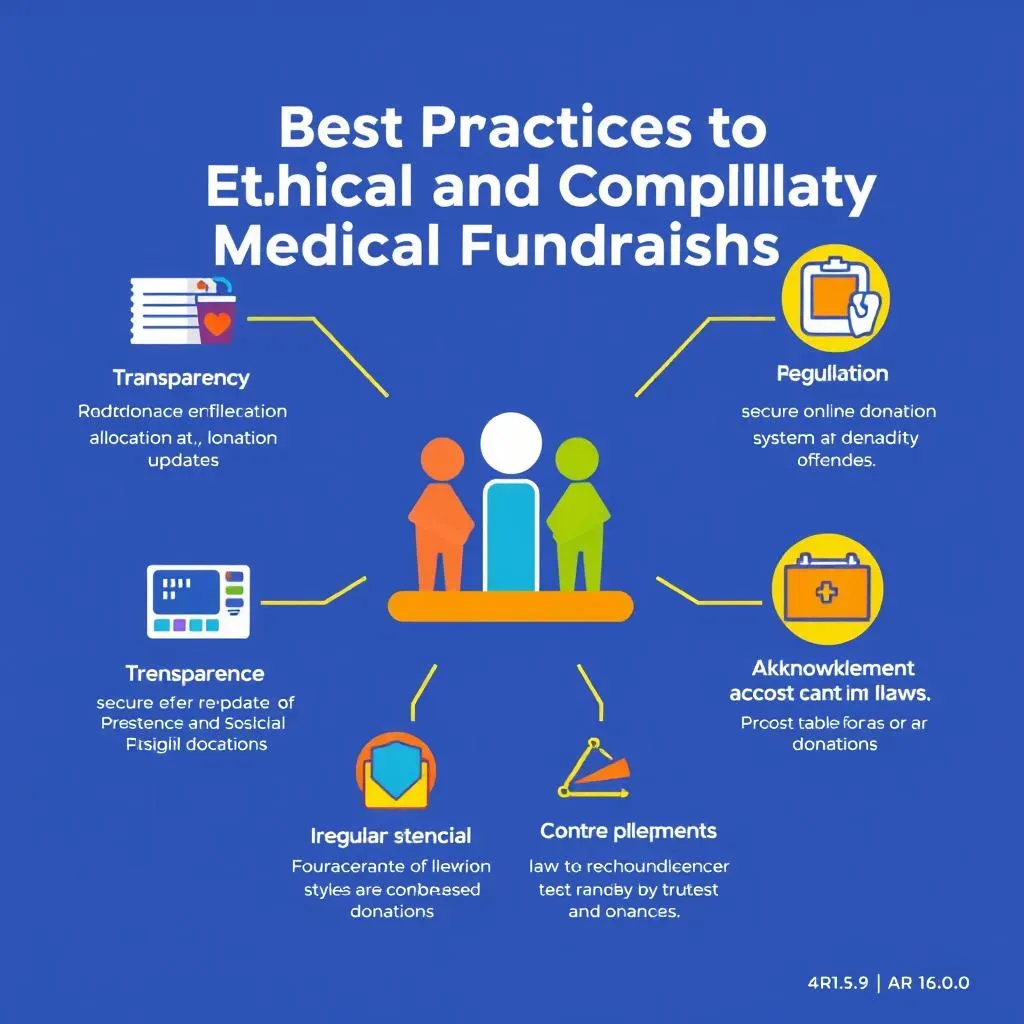Table of Contents
Raising money for medical expenses is often a stressful and complex process. This article is your guide to navigating the often-murky waters of medical fundraising, focusing on the crucial intersection of medical fundraising laws and ethics. We'll equip you with the knowledge you need to conduct fundraising campaigns legally and ethically, ensuring you protect both your donors and your reputation. First, we'll explore the legal framework surrounding medical fundraising, outlining key regulations and compliance requirements. Next, we'll delve into the ethical considerations, emphasizing the importance of transparency, patient autonomy, and responsible fundraising practices. We'll then discuss practical best practices, offering actionable strategies for creating successful and ethical campaigns. Finally, we'll examine real-world examples, highlighting both successful and unsuccessful campaigns to illustrate the points discussed. By the end, you'll have a clear understanding of how to approach medical fundraising with integrity and confidence, ensuring that your efforts are both effective and morally sound. Let's get started!
Understanding the Legal Landscape of Medical Fundraising

Understanding the Legal Landscape of Medical Fundraising
So, you're diving into the legal side of medical fundraising? That's a smart move! It's a surprisingly complex area, but don't worry, we'll break it down. First off, you've got federal laws, like HIPAA, which is all about protecting patient privacy. You absolutely *must* understand HIPAA compliance, especially if you're handling any patient information during your fundraising efforts. A simple mistake can lead to hefty fines and serious reputational damage. Think of HIPAA as the ultimate gatekeeper of patient data – it sets strict rules about who can access what information and how it should be handled. This is incredibly important, and ignoring it is like walking a tightrope without a net. Need help setting up a campaign? Check out our guide on how to set up a campaign.
Legal Area | Key Considerations |
|---|---|
HIPAA Compliance | Protecting patient privacy, data security |
State Solicitation Laws | Registration requirements, disclosure rules |
Tax Laws | Nonprofit status, tax-deductible donations |
Then there are state-specific laws. These vary wildly, so you'll need to research the regulations in each state where you're operating. Some states have strict rules about registering charities and disclosing financial information. Others might have specific regulations about how you can solicit donations. Ignoring these laws can lead to legal trouble, which can be costly and time-consuming. It's a bit like navigating a maze blindfolded – you need a map (thorough research) to avoid getting lost (legal issues). For tips on navigating the challenges of medical fundraising, check out our post on medical fundraising challenges.
- Federal Laws (e.g., HIPAA)
- State-Specific Regulations (vary greatly)
- Tax Implications (nonprofit status, deductions)
Finally, don't forget about tax laws. If you're a nonprofit, you need to understand the rules around tax-deductible donations. This ensures that your donors receive the proper tax benefits for their contributions. It also impacts how you can report your income and expenses. Getting this wrong can lead to serious tax penalties. This is like keeping your financial books in perfect order – accuracy is key. Need some ideas to boost your fundraising? We've got ultimate fundraising ideas for you.
Ethical Considerations in Medical Fundraising: A PatientCentric Approach

Ethical Considerations in Medical Fundraising: A PatientCentric Approach
So, we've covered the legal side; now let's talk ethics. This is where things get really interesting – and crucial. Because while the law sets minimum standards, ethics sets the gold standard. It's all about putting the patient first. Think of it this way: are you genuinely helping people, or are you just trying to raise money? The difference is massive. Transparency is key. Be upfront about how donations will be used – don't hide anything. Patients need to trust you, and that trust is built on honesty. If you're not sure how to craft a compelling story that resonates, check out our guide on writing a compelling story. Don't use emotionally manipulative tactics – that's unethical and frankly, pretty sleazy.
- Transparency: Be open about how donations are used.
- Respect: Treat patients with dignity and empathy.
- Honesty: Avoid misleading or manipulative language.
Another biggie is respect. Patients are going through a difficult time. They're vulnerable, and they deserve to be treated with empathy and dignity. Never pressure anyone into donating. Remember, it's their choice, and you should respect that. This isn't about maximizing profits; it's about helping people in need. Need more ideas to make your campaign a success? Check out our tips for successful crowdfunding.
Ethical Principle | Practical Application |
|---|---|
Transparency | Clearly state how donations will be used. |
Respect | Never pressure patients to donate. |
Honesty | Avoid misleading or exaggerated claims. |
Finally, be honest. Avoid misleading or exaggerated claims. Don't promise miracles or oversell your cause. Stick to the facts and let your honesty build trust. Remember, your reputation is everything. One bad review or accusation of unethical practices can severely damage your ability to raise funds in the future. For successful stories that can inspire you, look at our medical fundraising success stories.
Best Practices for Ethical and Compliant Medical Fundraising

Best Practices for Ethical and Compliant Medical Fundraising
Alright, let's talk best practices. Think of these as your secret weapons for ethical and compliant medical fundraising. First, transparency is king. Be crystal clear about how donations will be used. Will it go directly to medical bills? Research? Program development? Spell it out! Don't leave any room for ambiguity. Your donors deserve to know exactly where their money is going. A well-structured fundraising platform can significantly enhance transparency. Learn more about choosing the right platform by checking out our platform comparison guide.
- Crystal-clear donation allocation
- Regular updates to donors
- Independent financial audits (where applicable)
Next, keep your donors in the loop. Regular updates, showing how their generosity is making a difference, are essential. Think progress reports, photos, or even short videos showcasing the impact of their contributions. This keeps them engaged and reinforces their belief in your cause. Want to learn more about promoting your fundraiser effectively? See our tips on promoting medical fundraisers.
Best Practice | Benefit |
|---|---|
Transparent Reporting | Builds trust and accountability |
Regular Updates | Keeps donors engaged and informed |
Professionalism | Enhances credibility and inspires confidence |
Professionalism is key. This means having a well-designed website, professional communication, and a clear process for handling donations. It shows donors that you're serious and competent, which inspires confidence. Think about the overall impression you're creating – it's just as important as the cause itself. Struggling with some specific challenges? Our guide on medical fundraising challenges can help.
Finally, always seek independent financial audits (where relevant). This adds a layer of accountability and reassures donors that their money is being handled responsibly. It's a clear sign of your commitment to ethical and transparent fundraising practices. Transparency is the cornerstone of trust, and trust is the lifeblood of successful fundraising. For FAQs and answers to common questions, refer to our medical fundraising FAQs.
- Secure online donation systems
- Compliance with all relevant laws
- Acknowledgement of all donations
Case Studies and RealWorld Examples of Medical Fundraising Successes and Failures

Case Studies and RealWorld Examples of Medical Fundraising Successes and Failures
Let's dive into some real-world examples! One fantastic success story involved a family who used crowdfunding to cover their child's extensive cancer treatment. Their transparent and heartfelt campaign resonated deeply with donors, raising far more than their initial goal. They meticulously documented their journey, providing regular updates and photos, fostering a strong connection with supporters. This illustrates the power of authenticity and consistent communication. Want to learn how to craft a similarly compelling narrative? Check out our article on writing compelling fundraising stories.
- Transparency builds trust
- Regular updates keep donors engaged
- Authenticity resonates deeply
Conversely, a campaign that failed spectacularly involved a hospital foundation that lacked transparency. They were vague about how donations would be used, leading to donor distrust. Their communication was infrequent and impersonal, failing to build a meaningful connection with potential contributors. This highlights the critical importance of clear communication and accountability. Need some ideas to improve your campaign's promotion? Our guide on promoting medical fundraisers can help.
Successful Campaign | Unsuccessful Campaign |
|---|---|
Transparent communication | Vague and unclear communication |
Regular updates | Infrequent updates |
Strong emotional connection | Lack of emotional connection |
These examples underscore the importance of planning and execution. A well-structured campaign, combined with ethical practices, significantly increases the likelihood of success. Remember, it’s not just about the money; it's about building relationships, fostering trust, and making a genuine impact. For more inspiring success stories, see our collection of medical fundraising success stories.
